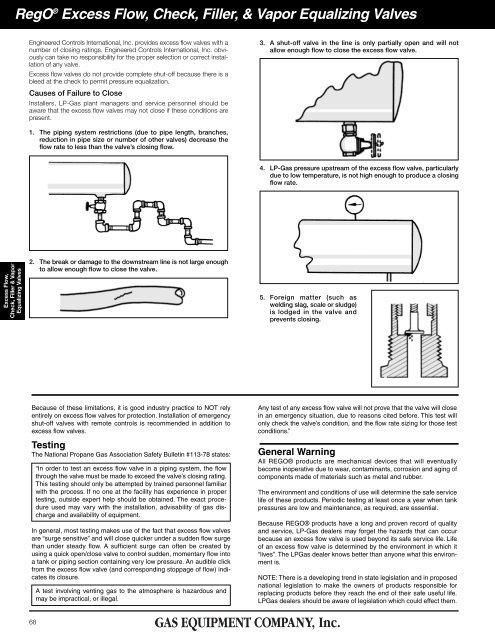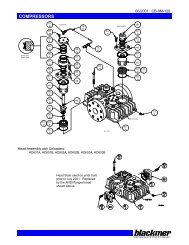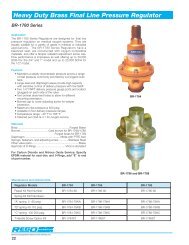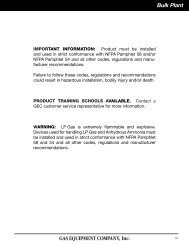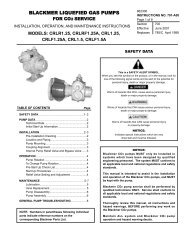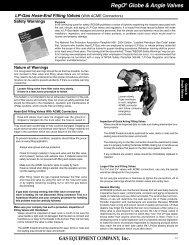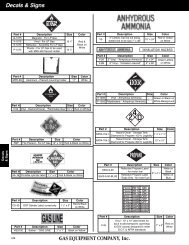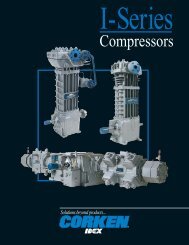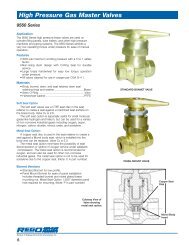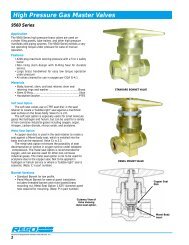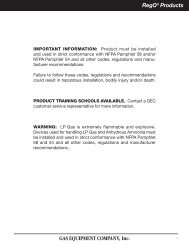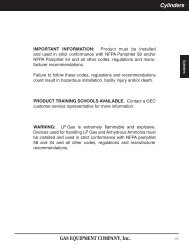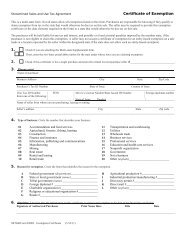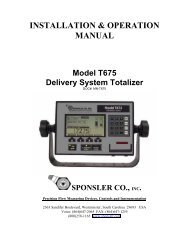Excess Flow, Check, Filler & Vapor Equalizing Valves
Excess Flow, Check, Filler & Vapor Equalizing Valves
Excess Flow, Check, Filler & Vapor Equalizing Valves
Create successful ePaper yourself
Turn your PDF publications into a flip-book with our unique Google optimized e-Paper software.
RegO ® <strong>Excess</strong> <strong>Flow</strong>, <strong>Check</strong>, <strong>Filler</strong>, & <strong>Vapor</strong> <strong>Equalizing</strong> <strong>Valves</strong>Engineered Controls International, Inc. provides excess flow valves with anumber of closing ratings. Engineered Controls International, Inc. obviouslycan take no responsibility for the proper selection or correct installationof any valve.<strong>Excess</strong> flow valves do not provide complete shut-off because there is ableed at the check to permit pressure equalization.Causes of Failure to CloseInstallers, LP-Gas plant managers and service personnel should beaware that the excess flow valves may not close if these conditions arepresent.3. A shut-off valve in the line is only partially open and will notallow enough flow to close the excess flow valve.1. The piping system restrictions (due to pipe length, branches,reduction in pipe size or number of other valves) decrease theflow rate to less than the valve’s closing flow.4. LP-Gas pressure upstream of the excess flow valve, particularlydue to low temperature, is not high enough to produce a closingflow rate.<strong>Excess</strong> <strong>Flow</strong>,<strong>Check</strong>, <strong>Filler</strong> & <strong>Vapor</strong><strong>Equalizing</strong> <strong>Valves</strong>2. The break or damage to the downstream line is not large enoughto allow enough flow to close the valve.5. Foreign matter (such aswelding slag, scale or sludge)is lodged in the valve andprevents closing.Because of these limitations, it is good industry practice to NOT relyentirely on excess flow valves for protection. Installation of emergencyshut-off valves with remote controls is recommended in addition toexcess flow valves.TestingThe National Propane Gas Association Safety Bulletin #113-78 states:“In order to test an excess flow valve in a piping system, the flowthrough the valve must be made to exceed the valve’s closing rating.This testing should only be attempted by trained personnel familiarwith the process. If no one at the facility has experience in propertesting, outside expert help should be obtained. The exact procedureused may vary with the installation, advisability of gas dischargeand availability of equipment.In general, most testing makes use of the fact that excess flow valvesare “surge sensitive” and will close quicker under a sudden flow surgethan under steady flow. A sufficient surge can often be created byusing a quick open/close valve to control sudden, momentary flow intoa tank or piping section containing very low pressure. An audible clickfrom the excess flow valve (and corresponding stoppage of flow) indicatesits closure.A test involving venting gas to the atmosphere is hazardous andmay be impractical, or illegal.Any test of any excess flow valve will not prove that the valve will closein an emergency situation, due to reasons cited before. This test willonly check the valve’s condition, and the flow rate sizing for those testconditions.”General WarningAll REGO® products are mechanical devices that will eventuallybecome inoperative due to wear, contaminants, corrosion and aging ofcomponents made of materials such as metal and rubber.The environment and conditions of use will determine the safe servicelife of these products. Periodic testing at least once a year when tankpressures are low and maintenance, as required, are essential.Because REGO® products have a long and proven record of qualityand service, LP-Gas dealers may forget the hazards that can occurbecause an excess flow valve is used beyond its safe service life. Lifeof an excess flow valve is determined by the environment in which it“lives”. The LPGas dealer knows better than anyone what this environmentis.NOTE: There is a developing trend in state legislation and in proposednational legislation to make the owners of products responsible forreplacing products before they reach the end of their safe useful life.LPGas dealers should be aware of legislation which could effect them.68


